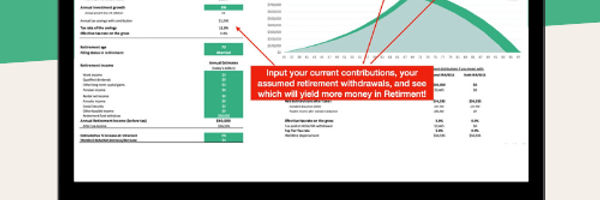This early retirement calculator can help you to estimate how much money you will need to meet your retirement goals. The calculator uses your current age, target retirement age, household income, and current retirement assets to determine how much money you'll need in retirement savings as well as how much money you'll need to save each month to reach your goal.

Roth IRA or 401k? This template will answer your questions.
With this template, you will get:
All DFY, simply add your details
Charts for comparison and clear answer
Easily update for any year (2023, 2024, 2025, etc…)

Calculator Definitions
The variables used in our online calculator are defined in detail below, including how to interpret the results.
Current Age (Years)
This is your current age, stated in years.
Target Retirement Age (Years)
This is the early retirement age that you're targeting.
Life Expectancy (Years)
This is your life expectancy when you reach your early retirement age. People mistakenly believe that life expectancies are in the range of 75 years of age. However, that figure applies only at birth. Financial planning experts often use a conservative estimate of age 90 or 95.
Desired Household Income ($ / Year)
Your desired household income is the level of income you would like to achieve while retired, stated in today's dollars, not future dollars.
Anticipated Rate of Inflation (%)
This is the anticipated annual growth rate needed to convert today's dollars into future dollars. For instance, if you expect inflation of 3.0% per year, then the growth rate of your retirement income is also 3.0%.
Current Retirement Assets ($)
If you currently have retirement assets in a Roth IRA, traditional IRA, 401k, 403b, or any other savings account, then enter the totals of all those funds here. This value should be the sum of all of the assets you plan to convert to household income when retired.
Return on Investments (%)
The return on investments is the annual rate of return you expect to realize on all of your retirement assets.
Other Income ($ / Year)
If your employer provides you with a pension plan, or you have another source of retirement income, then enter that value here.
Household Income at Retirement ($ / Year)
This is your expected household income when you reach your early retirement age. This value is based on your present annual household income, which has been increased by the anticipated rate of inflation you supplied earlier.
Other Income at Retirement ($ / Year)
The other income at retirement is the total amount of annual retirement income that you expect to obtain from a pension plan and / or Social Security, stated in future dollars.
Income from Retirement Assets ($ / Year)
This is the income supplied by your retirement savings plans. This value is the difference between your household income at retirement, and the annual income supplied by other income sources you might have at your disposal.
Minimum Savings at Retirement ($)
This is the minimum total of all your savings needed to retire early. The calculation used to derive this value assumes no money is left when you reach your life expectancy age.
Minimum Monthly Savings Target ($ / Month)
The minimum monthly savings target is the money you need to save each month to reach your minimum savings at retirement target.
Savings Needed to Maintain Assets ($)
The savings needed to maintain assets is the quantity of money you'll need to reach your retirement income goals, and leave the same level of assets you own to your heirs.
Monthly Savings Target ($ / Month)
The monthly savings target is the money you need to save each month to reach the level of total savings needed to maintain your assets, and allow them to be inherited by your heirs.
Optimal Savings at Retirement ($)
The optimal savings at retirement is calculated using the conservative 4 percent withdrawal rule. This rule of thumb states that you should have enough savings in retirement such that the first year's income requires you to withdraw only 4% of your assets.
Optimal Monthly Savings Target ($ / Month)
The optimal monthly savings target is the money you need to save each month to reach the level of optimal savings at retirement that coincides with the 4% withdrawal rule.
Early Retirement Calculator
Disclaimer: These online calculators are made available and meant to be used as a screening tool for the investor. The accuracy of these calculations is not guaranteed nor is its applicability to your individual circumstances. You should always obtain personal advice from qualified professionals.



.jpg)
.jpg)